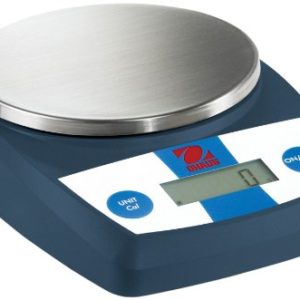Description
The Sartorius Corporation MSA2.7S0TRDM Cubis Balance is an ultra-micro balance with a capacity of 2.1g, a readability of 0.0001mg (0.1mcg), a 20mm diameter weighing pan, a color TFT touchscreen, an automatic draft shield, and 18 built-in applications that can be customized for complex lab weighing tasks. The touchscreen is a 5.7″ high-resolution TFT (thin-film transistor) with integrated software that provides interactive guidance to manage weighing tasks, user settings, and system settings. Basic functions can be accessed via the keypad. This balance has a USB port for connecting a computer with a Microsoft Windows 7, Vista, XP, 2000, ME, or 98SE operating system (sold separately) for data transfer. It also has an RS-232C port for connecting peripheral devices (sold separately), an Ethernet port for networking, and an SD card reader for importing and exporting data. To help ensure accuracy, the balance features a fully automatic internal temperature- and time-controlled calibration function (isoCAL), assisted leveling with a level indicator shown on the display, a motorized draft shield, and a factory certificate of conformity to specifications with detailed test protocol. The balance can also be calibrated using external weights. The draft shield minimizes interference from air movement to optimize readings and repeatability of results, is made of glass, and is operated using side keys that can be programmed to suit the user’s needs. To deter theft, the balance has a fastening point to attach a locking device (sold separately). It comes with a universal power supply and 120V line cord. An ultra-micro balance has finer readability than a micro balance, and is used in laboratories and other indoor settings for determining the mass of small samples of liquids, pastes, powders, or solids.
| Specifications | |
|---|---|
| Capacity/readability | 2.1g/0.0001mg |
| Linearity/repeatability | 0.0009mg/0.00025mg |
| Minimum sample weight (typical), according to USP (U.S. Pharmacopeia) standards | 1mg |
| Weighing units | gram, kilogram, carat, pound, ounce, troy ounce, grain, pennyweight, milligram, parts per pound, Austrian carat, Newton, pound:ounce, microgram |
| Display | 5.7″ high-resolution color TFT (thin-film transistor) touchscreen |
| Built-in applications | Unit conversion, SQmin function for minimum initial weight according to USP, isoCAL automatic calibration/adjustment function, individual identifiers, density determination, statistics, calculations, averaging, formulation, weighing in percent, time-controlled functions, totalizing, DKD measurement uncertainty, second tare memory, counting, checkweighing, alibi memory, audit trail |
| Interfaces | USB, RS-232C, Ethernet, SD card reader |
| Security | User passwords, fastening point for anti-theft locking device (sold separately) |
| Operating temperature range | 5 to 40 degrees C at 80% RH (relative humidity) up to 31 degrees C, decreasing linearly to 50% RH at 40 degrees C |
| Compliance | ISO (International Organization for Standardization), (Food and Drug Administration), USP, GxP (Good -x- Practice) |
| Power | 100-240V, 50-60Hz (120V line cord) |
| Dimensions | Weighing pan: 20mm diameter Weighing chamber: 70mm in height |
Balances and scales are measuring instruments used to determine the mass and weight, respectively, of an object. Unlike a balance, a scale’s accuracy is affected by gravity and must be recalibrated if it is relocated. In practice, the terms balance and scale are frequently used interchangeably, and the results are displayed in a variety of units, such as gram (g), ounce (oz), pound (lb), troy ounce (ozt), pennyweight (dwt), carat (ct), momme (mom), grain (GN), and tael (tl). The empty weight of a container used to hold objects (tare weight) on the balance or scale is removed prior to weighing, so that the scale reads zero with the container in place. The precision of both balances and scales is determined by the requirements of their intended use, and can be 0.0001g or better for analytical balances. Precision is verified and maintained with periodic calibration. For commercial use, scales and balances may be certified by organizations such as NSF International and National Type Evaluation Program (NTEP). Balances and scales may include data interfaces that allow connection to a computer, printer, or remote display. Balances and scales are made suitable for the environment in which they are used with protective housings, sealed keypads, and lighted displays. They may have built-in functions for tasks such as pill counting in pharmaceutical applications, postage calculations in shipping applications, or weight-totaling in warehouse applications. Balances and scales are used in a wide variety of applications and accommodate a wide range of weights.
Sartorius manufactures laboratory and process technologies and equipment for biopharmaceutical, biotech, and food industries. The company, founded in 1870, is headquartered in Gottingen, Germany.
What’s in the Box?
- Sartorius Corporation MSA2.7S0TRDM Cubis Balance
- Display/control unit
- Draft shield
- Universal power supply with 120V line cord
- Instructions
Ultra-micro balance with 18 built-in applications that can be customized for complex lab weighing tasks
2.1g capacity with 0.0001mg (0.1mcg) readability for precise readings, and 20mm diameter weighing pan to hold samples
High-resolution 5.7″ color TFT touchscreen with integrated software that provides interactive guidance to manage weighing tasks, user settings, and system settings
USB port for connecting a computer (sold separately) for data transfer, RS-232C port for connecting peripheral devices (sold separately), and Ethernet port for networking
Fully automatic internal temperature- and time-controlled calibration function (isoCAL), assisted leveling, automatic draft shield, and factory certificate to help ensure accuracy






Reviews
There are no reviews yet.